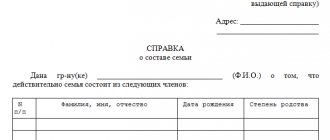About inheritance
What do you need to know when entering into an inheritance? There are two ways to determine inheritance rights. The first and most common of them is by law. An application for inheritance, according to Articles 1142–1145 of the Civil Code of the Russian Federation, can only be submitted by blood relatives. The following may apply for entry by law:
- The first are parents, children and spouses. Second in line are the brothers and sisters of the deceased, his grandparents.
- The third line is uncles and aunts. The fourth are great-grandparents.
- Fifth circle – great-aunts, grandfathers, grandchildren. Sixth are cousins, uncles and aunts, nephews and grandchildren.
- The last seventh line is stepfather, stepmother, stepdaughter and stepson.
If there are several heirs of one circle, then the inheritance mass will be divided equally between them. In some situations, the share size may be increased or decreased. A change in the legal order occurs in the absence of the previous circle of applicants, their refusal or inaction.
In the absence of all applicants for inheritance, the property will be recognized as escheated by law. According to Article 1151 of the Civil Code of the Russian Federation, non-inherited property will be transferred to the state in the absence of all successors.
The second method of entry is by will. Where to file for inheritance? The registration and entry process under the law and under a will are similar. The only difference is that by means of a will the testator has the right to independently determine who will be the recipient of the inherited property. In a will, the testator can:
- Establish a list of persons who can receive inherited property.
- Set the terms of inheritance and the executor of the will.
- Indicate persons who are unworthy of inheritance rights.
Wills often cause disputes between heirs and legal claimants. And the latter are trying to challenge the will of the testator through the court. But this is not easy to do, since according to the law, the will of the deceased can be declared void if it was written by an incapacitated person or under pressure (deception) from third parties.
Where to apply for inheritance
After the death of the giver, his successors must take action regarding the acceptance of the inherited property. There are two ways to accept the property of the deceased: contact a notary or actually enter into inheritance.
Contacting a notary is the most popular way to formalize the acceptance of an inheritance. The main reason is the registration of a certificate of inheritance, which is necessary in the future for registering property. Where to submit documents for inheritance?
The opening of an inheritance in a notary's office is carried out by a local specialist at the place of last residence of the giver. Successors must contact a lawyer and submit documents and an application for inheritance.
An inheritance can be opened in a notary's office at the location of the inherited property, for example, a house or apartment.
The law provides for the possibility of accepting inheritance without contacting a notary's office. According to Article 1153 of the Civil Code of the Russian Federation, successors can enter by taking certain actions in relation to the inheritance or the testator. The following actions can establish the fact of inheritance:
- On the use of the received property.
- To ensure its safety and maintenance in proper condition.
- To pay off the deceased's obligations, such as a loan or mortgage.
To recognize actual acceptance, it is necessary to take at least one action towards part of the inheritance mass. Actions should not be one-time in nature.
How to submit documents for inheritance in case of actual inheritance? This method of entry does not require the successors to formalize the acceptance with a notary. You can use the received inherited property for an unlimited amount of time after joining. However, in order to be able to realize the property, for example, sell or donate, it is necessary to issue a certificate of inheritance.
You can receive an inheritance document at any time after the actual entry. To do this, you need to contact a notary or court and establish the fact of acceptance of the inheritance. Read: “Actual entry into inheritance.”
Actions of a notary when entering into an inheritance
After the inheritance case is opened, the notary will have to collect all the necessary facts.
The law defines a specific list of duties of a notary:
- Evidence that the testator has died;
- Determine in what place and where exactly the inheritance case will be opened;
- Heirs are required to prove that they have rights to receive the deceased's inheritance;
- Clearly define what property is inherited;
- Are there any claims against the testator from creditors?
As a rule, the main circumstances are determined by contacting the notary office of successors and creditors with the appropriate package of documents. This package of documents also includes information about the amount of property that is an inheritance.
However, it is not always possible to determine ownership. In this case, the notary office makes inquiries and establishes the fact that there is inherited property. For this purpose, requests are sent to government bodies, individuals and legal entities. In this case, the order of inheritance does not matter. Inheritance can be by law or by law.
In order for the notary office to have the right to perform the necessary actions, an application from persons interested in the inheritance is required. In addition, the law determines the deadline for responding to requests from the notary’s office. It is a month. But the law does not oblige a notary to search for an inheritance at his own request.
In addition to appeals to various authorities, the notary's office also sends requests to the registry. This is required in order to establish the existence of a will that the deceased could have drawn up. Such an action is very important, since it makes it possible for the heirs to enter into their legal rights.
Entry and registration deadlines
When entering into an inheritance, it is important to know not only how to apply for an inheritance, but also the time frame within which this must be done. According to Article 1154 of the Civil Code of the Russian Federation, the deadline for submitting an application and documents for inheritance according to the law is six months from the date of death of the testator.
During this time, regardless of the presence of a will, the successors must contact a notary or actually accept the inheritance. The deadline for filing an application for inheritance after the death of the giver may be extended by an additional three months if the order of heirs changes.
Registration of an inheritance certificate takes six months from the date of opening the inheritance case. The successors' ownership rights to the inherited property arise immediately after the death of the giver.
What happens if you miss the deadline for accepting an inheritance? The law cannot deprive the right of entry in such a situation, but the property not accepted will pass to the next line of successors. A late applicant can restore his right in three ways:
- Contact a notary or court to establish the actual acceptance of the inheritance.
- Restore the deadlines for registration with a notary or in court, indicating the reasons for your omission.
- Obtain consent to join later than the established period from other heirs who have joined.
It is possible to restore the terms of entry in a guaranteed manner in court by presenting evidence of the reason why the applicant was unable to formalize the inheritance on time.
After the restoration of inheritance rights, the applicant has three months to submit an application and documents for registration of accession. If this deadline is missed, it will be almost impossible to accept the inheritance.
What does Russian legislation say about this?
The civil legislation of the Russian Federation gives very clear guidelines regarding such cases as happened to citizen K. Persons entitled to inheritance by law, in order of priority, cannot be deprived of this right in any other way if the will of the testator is expressed.
The lack of documents when inheriting an apartment is not an obstacle to inheritance. It’s just that entering into an inheritance would take a little longer if the necessary documents were on hand. It is necessary to have the right to inheritance. If a citizen has this right, then collecting the necessary documents is a kind of formality.
Even if the deadlines established by law are missed, the heir, if there are good reasons for missing it, can prove his right to inheritance through the court, and ultimately receive the apartment he is owed.
Obtaining a certificate of inheritance
We have figured out the timing and place of opening the inheritance. The next, no less important questions are how to apply for an inheritance and what documents are needed. The procedure for obtaining a certificate of inheritance from a notary is a certain procedure that each applicant must complete.
How does joining a notary take place? The first thing you need to do is submit an application about your desire to join. The document must contain information about the applicant, the testator and the right that allows the heir to receive the property left behind. See an example of an application here: “We are writing an application for the right to inheritance from a notary (sample).”
What's next? After the application is written, the action plan will be as follows:
- Prepare the documents necessary for the application for inheritance.
- Determine the value of the inheritance (conduct an assessment).
- Pay the assigned state fee for issuing the certificate.
- Receive a certificate of right of entry.
When registering the right to inheritance, a tax is charged - a state duty for issuing a certificate. For successors of the first and second stages, you need to pay 0.3% of the value of the property received. For all other candidates – 0.6% of the inheritance price.
Below we will tell you about what documents are needed to apply for an inheritance. Remember: when carrying out the actual acceptance, there is no need to draw up documents with a notary. This can be done later, at any convenient time.
Certificate of right to inheritance by law
A certificate of title to inherited property is an important document. That is why you need to go through a long and complex procedure in order to collect the necessary package of documents. Of course, this is not only a certificate, but a document that means that the heir has the legal right to dispose of the property at his own discretion.
You can receive this document six months after the inheritance case was opened. Within the specified period, you must collect the entire package of documents and contact a notary with a statement of your desire to enter into inheritance rights, a sample of which can be found here.
If there are no obstacles to receiving the inherited property, then the heirs receive a document on the right to it. This certificate is issued on a state-issued form. It must have a signature and a wet seal from the notary's office.
A document giving the right to dispose of property can be issued:
- In the form of one certificate, which indicates all inherited property;
- All heirs can receive several certificates for each part of the property;
- A certificate for all property is prepared for each successor;
- Each successor may be issued certificates for each piece of property.
Despite the fact that the law does not oblige successors to obtain this document, it is nevertheless very important. In order to receive a certificate in your hands, you must contact a notary with a statement of desire to enter into an inheritance, and in addition, pay the fee required by law.
A document confirming the rights to inherited property (certificate) is a paper that confirms the legality of ownership and disposal of the property of the deceased, regardless of what part of it was inherited. At the same time, Part 2, Clause 1, Article 1162 of the Civil Code of the Russian Federation does not require the successor to obtain a certificate. However, if there are plans to dispose of the property at your own discretion in the future, then you still need to obtain this document.
This rule applies to almost any property, regardless of whether it is an apartment or a car, which requires a state registration procedure.
What debts are not inherited?
Read about which relatives are the primary heirs here.
How to contest a will for inheritance, read the link:
Note!
In order to begin the procedure for obtaining a certificate, you need to draw up a corresponding application to the notary's office. In turn, this requires justification of the heir's rights to the property of the deceased.









